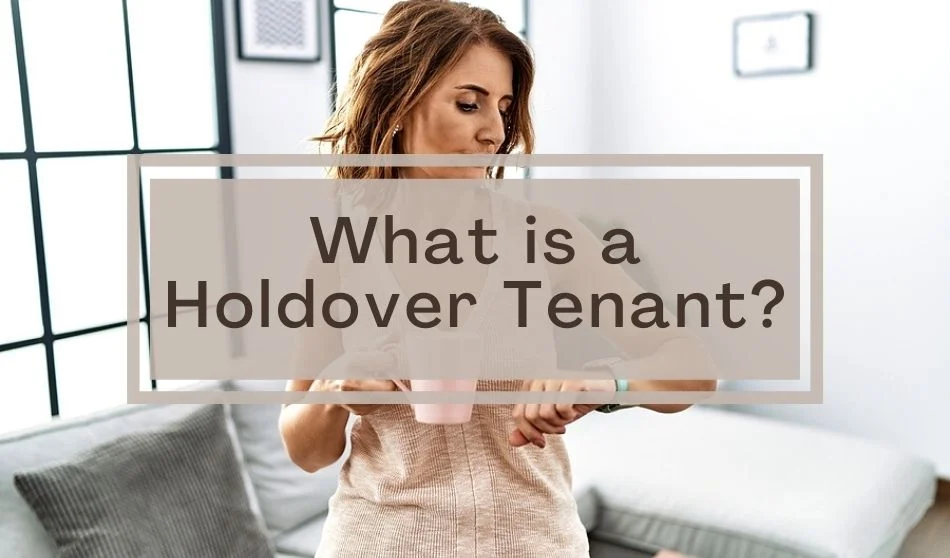The United States real estate market is the second most valuable and profitable property market in the world. It has a value of $132.00 in 2024 with more than 44.1 million tenants. Here you can find all types of property for rent, including apartments, family houses, condos, office buildings, industrial buildings, retail outlets, warehouses, and coops.
In the United States, the tenant and landlord must form a lease agreement before renting a property. This legal document states the terms and conditions of the lease. It contains the lease duration and states that when the lease period ends, the tenant should vacate the property. In circumstances where the tenant does not vacate the property, they become holdover tenants.
A holdover tenant is a person who continues to live in the property without a legally binding Lease Agreement. With such tenants, it becomes difficult for the landlords to manage their property efficiently. This comprehensive guide provides landlords with some ways to handle the holdover tenant. But before that, let’s overview what a holdover tenant is.
What is a Holdover Tenants?

A holdover tenant lives in the property after the lease period expires without any notice or provision for a lease extension. In this situation, the tenant pays month-to-month rent to the landlord until eviction or provision of a new lease agreement.
If there is a provision or formation of a new lease agreement, the tenant can make payment to the landlord upon agreed terms and conditions. On the other hand, if the landlord does not want to continue the lease but the tenant refuses to leave, it becomes a trespass. Under such circumstances, the landlord has the legal right to evict the Tenant from the property.
Before eviction, the landlord must give the tenant prior notice. This notice includes the time the tenant has to vacate the property and the damages, rent, or maintenance charge they must pay.
The law also provides some rights to the holdover tenant they possess during the eviction process. Let’s have a look at what are the holdover tenants right.
What are the Holdover Tenants’ Rights?
Unlike regular tenants, holdover tenants also have some rights. These rights protect them against the eviction process and provide them with legal protection. Here are some of the rights that holdover tenants possess:
1. Written Notice
The landlord should give a 30-90 days prior eviction notice to the holdover tenant so that they can have sufficient time to find a new place to live in. The landlord cannot evict the holdover tenant without giving a proper notice.
2. Security Deposit
The holdover tenant has a right to receive the security deposit back from the landlord. However, if there is any potential damage to the property, the landlord can withhold the security deposit and use it as compensation.
3. Eviction Process
If the landlord does not want to continue the lease, they should follow the legal eviction process. They cannot simply lock the property or ask you to leave. They must provide a legal notice for eviction and follow the procedure established by law.
How Can Landlords Handle Holdover Tenant Effectively?

Handling a holdover tenant can be a tricky task. Sometimes, the tenant refuses to vacate the property, leading to legal consequences. Court proceedings, legal documentation, and hiring an attorney need a lot of time, effort, and financial obligations. To avoid such circumstances, you can use the following tips and tricks to handle holdover tenants.
1. Clear Lease Term
One of the easiest ways to avoid a holdover tenancy is to state clear terms and conditions in the lease agreement. The lease agreement should have a separate clause for the starting period of the lease when it ends and the conditions for renewal. Stating the renewal conditions helps the landlord to avoid future misunderstandings and problems.
2. Communication
Communication is the best way to remove any disparities in the tenancy process. Before the expiration of the lease agreement, communicate with the tenant about their plans and whether they want to renew the lease or vacate the property. If you are not willing to rent the property anymore, communicate this with the tenant. Discuss everything, listen carefully to the tenant, and answer their questions to simplify the tenancy process.
3. Consult an Expert
You must consult an expert like Citadel Property Management Corp. to learn the jurisdiction, laws, and remedies to handle the holdover tenant. The expert guides you and helps you handle a holdover tenancy effectively. Moreover, the expert can advise you on the property’s value, the rent you should charge, and the terms and conditions that favor you.
4. Penalty Fee for Late Decision
You can charge a penalty fee for a late decision. This penalty fee can be an increase in rent for a month-to-month lease agreement or any amount specified in the lease term. This will lead to a quick decision by the tenant. If the tenant wants to use the property and renew the lease, you can look for changes in the terms and conditions of the lease (if any). If the tenant does not want to extend the lease, you will have sufficient time to find a new tenant.
5. Legal Notice
Familiarize yourself with the eviction process and the notice period to avoid legal consequences. Furthermore, do not forget to send a prior notice to the tenant one or two months before the lease expires.
Unlock the Secret to Manage the Holdover Tenant: Consult an Expert Today
Handling holdover tenants can be tricky and challenging. The landlord needs to send 30-90 days’ notice to the tenant before the lease period ends. If the tenant wants to renew the lease agreement, the landlord needs to make a new agreement. They can add some new clauses or alter the terms and conditions in the agreement. But for that, they need good communication and negotiation skills.
If the tenant is unwilling to make a new agreement or vacate the property, the landlord must carry out the eviction process. It requires drafting and sending notices, legal proceedings, financial obligations, and hiring a good attorney. To avoid this situation, the landlord can consult a property management firm like Citadel Property Management Corp. and find the best solution to such problems. Consulting an expert can open doors to an innovative approach towards every problem.
Frequently Asked Questions
1. Can a landlord evict a holdover tenant immediately?
No, a landlord does not have the right to evict a holdover tenant immediately. The landlord must give a 30-90 days prior notice before eviction.
2. Can a landlord charge rent from a holdover tenant after the lease expires?
Yes, the tenant can charge rent from a holdover tenant after the lease expires if the tenant is still living on the property and needs time to renew the lease or vacate the premises.
3. Can a landlord give notice to the tenant to vacate the property when the lease period expires?
Yes, the landlord can ask a tenant to vacate the property when the lease expires.
4. Can a landlord withhold the security deposit of a holdover tenant for damages?
Yes, the landlord can withhold the security deposit of a holdover tenant for potential damages to the property.



